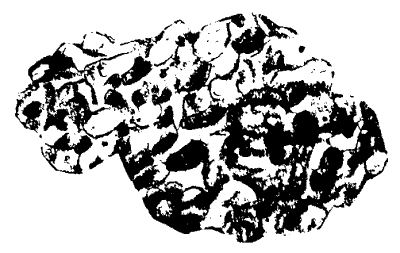 |
Science Frontiers ONLINE No. 127: Jan-Feb 2000 |
|
|
Nuclear bombs will not save the earth!
Not too long ago, geologists adamantly denied that there were any large meteor craters pockmarking our planet. Now, they find 100-kilometer craters on a regular basis. And scientists are casting worried looks at those near-earth asteroids, knowing that one day one will be on a collision course.
Not to worry, say the modern-day Technocrats, we will launch nucleararmed rockets that will nudge such cosmic threats into harmless trajectories.
These Pollyannas are presumptious. They assume that asteroids are hard, cohesive objects that will be shoved aside by a few megatons of explosive energy. There are two things wrong with this idea, and these reveal how radically our ideas about the nature of asteroids have changed in just 10 years.
First, most astronomers will now agree that asteroids are orbiting rubble piles rather than monolithic objects. For example, the near-earth asteroid
Mathilde, 53 kilometers in diameter, has a density of only 1.3 grams/cubic centimeter. Its porosity must be greater than 50%. It is not a hard, coherent object. Instead of a bullet, it is more like a cloud of shotgun pellets. It would be hard to divert all this debris with a nuclear blast.
To make matters worse, asteroids like Mathilde are stickier than a cloud of buckshot. This fact is deduced from photos of asteroids showing many to be marked by huge craters. (Mathilde has one 33 kilometers wide.) K.R. Housen et al, using laboratory tests and scaling data, argue that asteroid craters were not blasted out by collision. (Mathilde is not "shattered" as one would expect given such a huge crater.) Rather, the craters are "dents" instead of holes! Cosmic rubble piles are like sponges. Collisions with other rubble piles result in compression of the target surface and accretion of the smaller object. In effect, asteroids are energy absorbers and will hardly be fazed by a nuclear detonation.
(Asphaug, Erik; "Survival of the Weakest," Nature, 402:127, 1999.
Comment. We are doomed -- but not right away.
 | Many asteroids are probably only plum-puddings of accreted debris. |